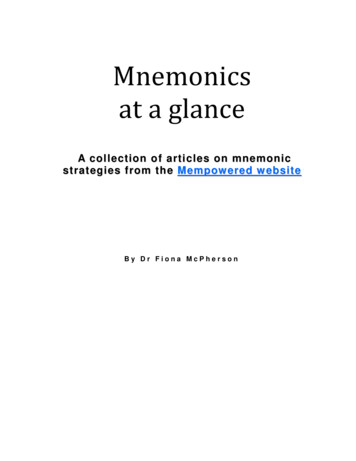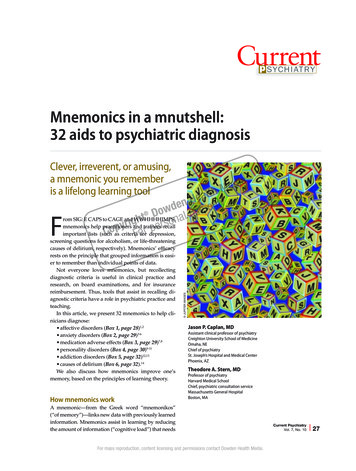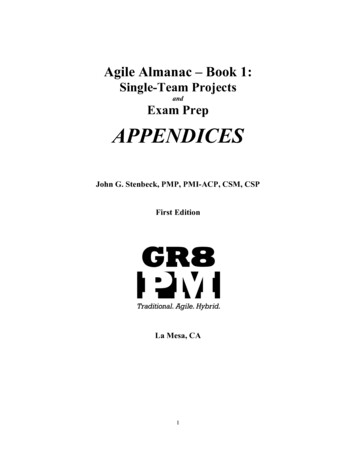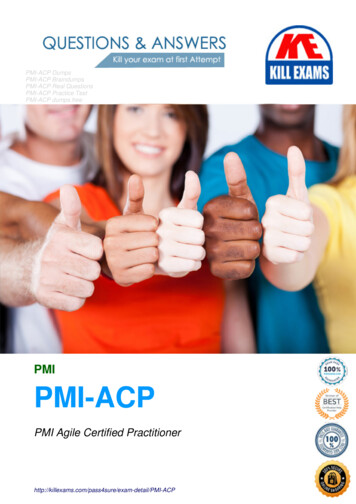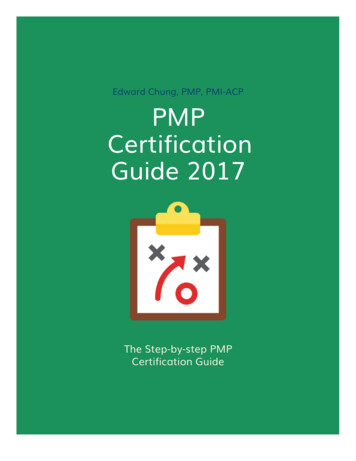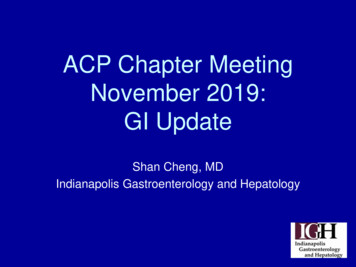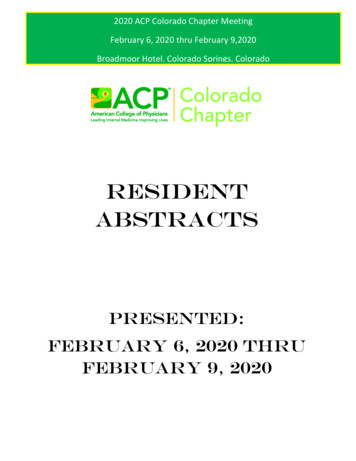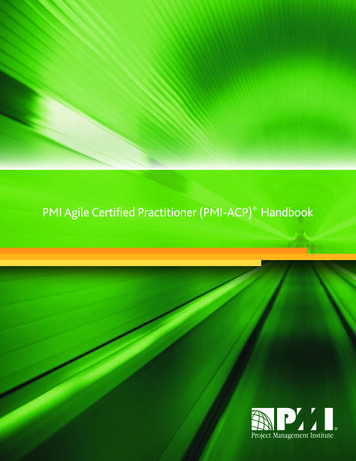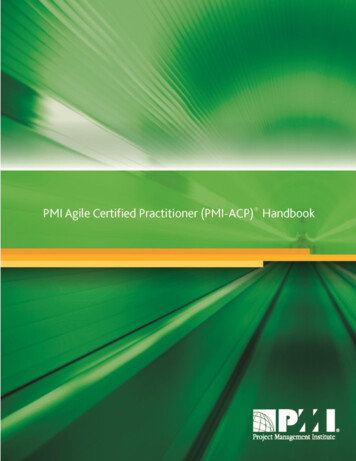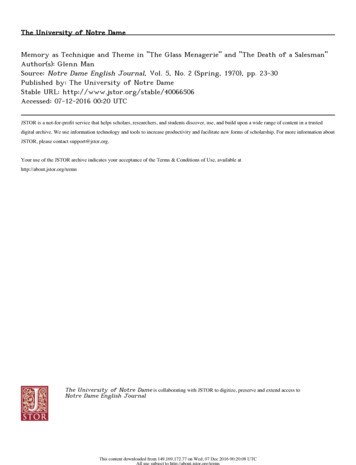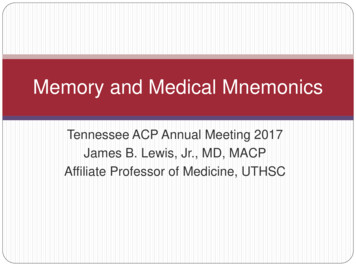
Transcription
Memory and Medical MnemonicsTennessee ACP Annual Meeting 2017James B. Lewis, Jr., MD, MACPAffiliate Professor of Medicine, UTHSC
History of Mnemonics
Rise and Fall of Mnemonics
Moonwalking with Einstein US and World MemoryChampionships Playing cards Poem Strangers with 10 bits ofinformation 100 names and faces Digit recall Random words
Memory – Foundations and Applications Bennett Schwartz, PhD Professor of Psychology Florida InternationalUniversity Courses in memory
Memory Physiology Working (short term) memory 30 seconds Seven bits of information Reading a book, following thislecture Impaired in Alzheimer’s andADHD Long term memory Requires changes in braincells Encoding, rehearsal, andretrieval 60% gone within 30 minutes
Memory Physiology
Mnemonics and Mnemonists Mnemonic - Any learningdevice that enhancesinformation retention Mnemonist – person withextraordinary memorymostly achieved throughvarious techniques andpractice Alex Mullen – memorized adeck of playing cards in 20 seconds and 3000 digitsin less than an hour.
Science of Memory – Four Principles Process what you arelearning for meaning Practice retrieval of memories Use your own metamemory,the awareness of your ownmemory processes Distribute your learning effort
Process for Meaning Disorganized outlines requiring studentreorganization are more effective learning devicesthat clean, clear outlines Use auditory and visual mnemonics tofacilitate retention of facts Multitasking and distractions are the enemy oflearning
Practice Good Retrieval Techniques Testing yourself is far more effective thanrereading material Flashcards are highly effective Study under variable mental and physicalconditions to help recall information When retrieval conditions meet encodingconditions, recall will be maximal
Beware of Metamemory Mistakes Human mind overestimates memory We underestimate our own forgetting and futureremembering Study items you think you already know Review critical lecture materials intermittently Learning styles are bogus Region of proximal learning Apply study especially to the easiest of items justbeyond what you have already mastered Study the most difficult itemsonly if ample time
Avoid Massed Practice Massed practice (cramming) helps short-term butnot long term memory Distributed practice increases long-term learning Distributed practice less satisfying than cramming(another metamemory trick)You can get a great deal from rehearsalIf it just has the proper dispersalYou would just be an assTo do it en masseYour remembering would turn out muchworsal.
Reasons for Medical Mnemonics Simplest memory system availableTime savingUseful teaching deviceBetter health care FAST COVERABCD
Types of Medical MnemonicsAcronyms An abbreviation or word formed from the initialletters of a list Lay example – HOMES Medical example SLUDGE Salivation Lacrimation Urination Defecation GI upset Emesis
Types of Medical MnemonicsAcronyms An abbreviation or word formed from the initialletters of a list Lay example – HOMES Medical example SLUDGE Salivation Lacrimation Urination Defecation GI upset Emesis
Types of Medical MnemonicsAcrostics Initial letter of a series of words generate a list Lay example – Kids Prefer Cheese Over FriedGreen Spinach Medical example – Bacon Lettuce Tomato Ketchup Pickle Mayonnaise Mustard
Types of Medical MnemonicsAcrostics Initial letter of a series of words generate a list Lay example – Kids Prefer Cheese Over FriedGreen Spinach Medical example –tumors metastasizing to bone Bacon - Breast Lettuce - Lung Tomato - Thyroid Ketchup - Kidney Pickle - Prostate Mayonnaise – Multiple Myeloma Mustard - Melanoma
Types of Medical MnemonicsVisual Lay example Medical example
Causes of Splenomegaly Inflammatory Infectious Malignancy Congestive – CHF andCirrhosis Collagen Vascular Hemolysis
Visual Mnemonic for Splenomegaly**HW
Kinesthetic Mnemonic for Pancreatitis StagesNormal pancreasEnlarged pancreasPeripancreatic inflammationOne pancreatic fluid collectionTwo or more pancreatic fluidcollections
Creation of Medical Mnemonics Choose hard to remember list of diagnoses or treatmentsUse a working memory associative hook for retrievalConsider an on-line Scrabble dictionaryUse synonyms to assist construction– e.g.,malignancy, neoplasm, cancer; drugs andmedicationsThe more bizarre and the more visual, the betterExperiment on an unsuspected learnersReview every 3-6 months to retain in memory; yourown creations seem easier to rememberReview every 2-3 years for accuracy
Clubbing of the Fingers Congenital, cystic fibrosis cirrhosis, congenital HDLung abscessUlcerative colitisBrachial AV fistulaBronchiectasisInfectious endocarditisInterstitial lung diseaseNeoplasia (cancer)Graves’ disease
Causes of Acute Pancreatitis Infections – mumps Gallstones Ethanol Trauma, Triglycerides SurgeryMalignancyAutoimmuneScorpion stingHypercalcemiaERCPDrugs
Example of Mnemonic CreationIndications for statin therapy – 2013 AHAguidelines Adults 21 years of age with primary LDL–C 190mg/dL should be treated with statin therapy. Moderate-intensity statin therapy should be initiated orcontinued for adults 40 to 75 years of age with diabetesmellitus. Adults 40 to 75 years of age with LDL–C 70 to 189mg/dL, without clinical ASCVD* or diabetes and anestimated 10-year ASCVD risk 7.5% should betreated with moderate- to high-intensity statin therapy High-intensity statin therapy should be initiated orcontinued as first-line therapy in women and men 75years of age who have clinical ASCVD*, unlesscontraindicated.
Example of Mnemonic CreationIndications for statin therapy – 2013 AHAguidelines Adults 21 years of age with primary LDL–C 190 mg/dLshould be treated with statin therapy. Moderate-intensity statin therapy should be initiated orcontinued for adults 40 to 75 years of age with diabetesmellitus. Adults 40 to 75 years of age with LDL–C 70 to 189mg/dL, without clinical ASCVD* or diabetes and anestimated 10-year ASCVD risk 7.5% should be treatedwith moderate- to high-intensity statin therapy High-intensity statin therapy should be initiated orcontinued as first-line therapy in women and men 75years of age who have clinical ASCVD*, unlesscontraindicated.
Medical Acronym MnemonicWhen to Start a Statin L – LDL 190 A – Atherosclerotic disease R – 10-year risk of 7.5% D – diabetes timator/
Stensen’s and Wharton’s Ducts Easy to remember the eponyms Hard to remember location Hard to remember drainage pattern Thoughts?
Mnemonic for Salivary Ducts Stenson’s – think “S” for second molar andsmokeless tobacco (between check and gum).Logically drains the parotid gland. Wharton’s – think “W” for Wet Willie (requiresfinger against tongue to initiate). Logically drainsthe submandibular and sublingual glands.
Why Bother With Mnemonics Fund of knowledge is decreasing with externalretrieval systems Memory is poor when computer-retrievedinformation is said to be “saved.” Rereading is amuch less effective learning device than retesting. Chance favors only the prepared mind. There is a direct link between memory andcreativity. Foer: Memory is like a spiderweb that catches newinformation. The more it catches, the bigger it grows.And the bigger it grows, the more it catches.
Only God Creates Ex Nihilo
References Schwartz B. Memory Foundations and Applications. 2018. 3rd Ed. Thousand Oaks, CA: SagePublications.Foer J. Moonwalking with Einstein. 2011. London:Penguin Books.Clark RC. Evidence-Based Training Methods. 2015.Alexandria VA: ATD Press.Schacter DL. The Seven Sins of Memory. 2001.Boston: Houghton Mifflin.Wolters FJ et al. Sustained impact of UK FAST-testpublic education on response to stroke: a popluationbased time-series study. Int J Stroke 2015; 10:11081114.Runciman W, Merry A. Crises in clinical care: anapproach to management. Qual Saf Health Care
Creation of Medical Mnemonics Choose hard to remember list of diagnoses or treatments Use a working memory associative hook for retrieval Consider an on-line Scrabble dictionary Use synonyms to assist construction–e.g., malignancy, neoplasm, cancer; drugs and medications The more bizarre and the more visual, the better Experiment on an unsuspected learners
